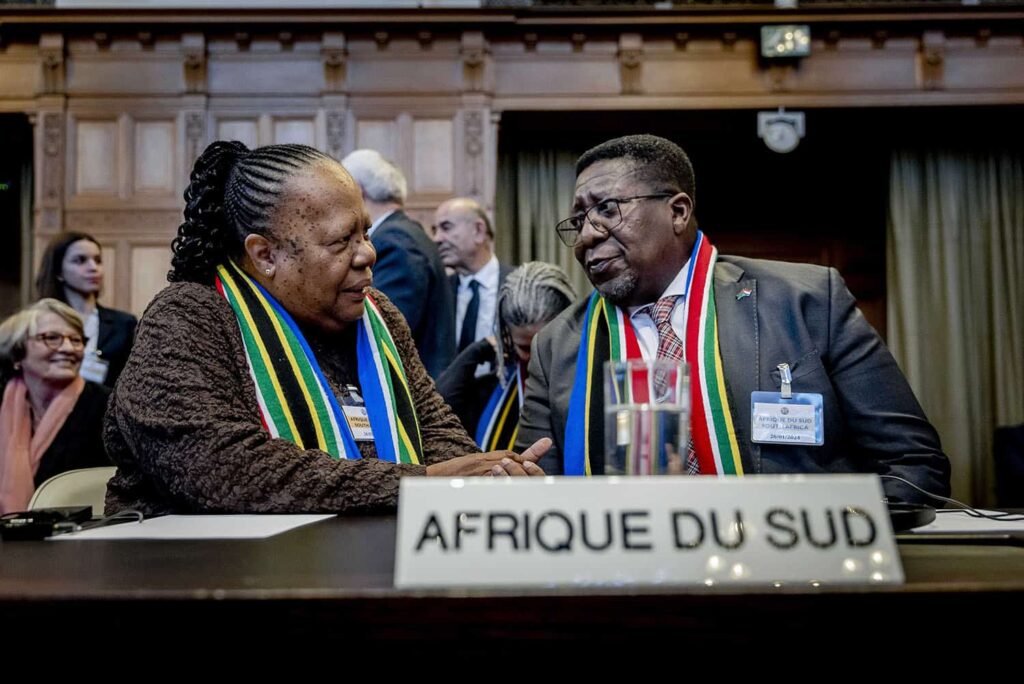
[Photo source - The Citizen]
The Palestinians look to the ICJ to be the beacon of justice in the face of such a grave crisis, writes Ziyad Motala, Professor of Law at the Howard Law School.
In a further move to address the relentless assault by Israel in the Gaza Strip, South Africa has taken an additional decisive step by approaching the International Court of Justice (ICJ). Their plea seeks additional measures against Israel, framed under the Convention on the Prevention and Punishment of the Crime of Genocide. This application not only places South Africa on solid legal grounds but also emphasizes the urgent need for international intervention to prevent a deterioration of the humanitarian catastrophe in Rafah. As the facts unfold, it becomes increasingly imperative for the ICJ to grant an additional order, safeguarding the lives and rights of countless vulnerable Palestinians.
The crux of South Africa’s application rests on the violation of the Genocide Convention, specifically focusing on Article III, which unequivocally prohibits acts leading to genocide. The ICJ’s initial order on January 26, 2024, underscored the urgency of preventing irreparable harm to the rights of Palestinians in Gaza, explicitly stating their right to be protected from acts of genocide. Shockingly, the subsequent developments in Rafah, as detailed in South Africa’s application, demonstrate a reckless disregard by Israel for the court’s initial orders, intensifying the call for the ICJ to take further swift and decisive action.
South Africa’s comprehensive presentation sheds a harsh light on the Israeli military offensive in Rafah, a city that houses more than half of Gaza’s population, predominantly in makeshift tents. The evacuation orders imposed by Israel have coerced the vulnerable Palestinian population into seeking refuge in Rafah, creating a dire situation where, as the International Committee of the Red Cross emphasizes, there is simply “no option” for further evacuation.
The recent announcement by the Israeli Prime Minister Benjamin Netanyahu, followed by a military assault on Rafah, has elicited widespread international condemnation. The looming threat of a large-scale military operation, including a potential ground invasion, has been rightly labelled as a “recipe for disaster” by UNRWA Commissioner-General, introducing an “additional layer of endless tragedy.” Reports from the ground suggest an alarming increase in the number of displaced persons and casualties.
The dire consequences of an intensified assault on Rafah are vividly outlined by various international bodies, including the United Nations Secretary-General and UNICEF. The potential for a massacre of unparalleled scale and a humanitarian nightmare underscores the immediate and imperative need for the ICJ’s intervention. Satellite imagery reveals extensive damage to critical infrastructure, including hospitals, shelters, and markets, further exacerbating the plight of civilians.
In response to this unfolding tragedy, South Africa urges the ICJ to exercise its power under Article 75 (1) of the Rules of Court. Failure to act would potentially have devastating consequences for hundreds of thousands of Palestinian civilians, and the legal precedent set by the LaGrand case is aptly cited. The LaGrand case involved two individuals from Germany who were going to be executed in the United States without being accorded their due process rights under the Vienna Convention on Consular Relations. The court’s position in that case emphasizes the ICJ’s discretion to act swiftly, even without holding oral hearings, in situations of extreme urgency even when involving one or two individuals.
Vulnerable
South Africa makes a compelling argument that the scale of the crisis in Rafah, affecting an estimated 1.4 million vulnerable Palestinians far exceeds the harm in LaGrand and demands immediate action to prevent further egregious breaches of their rights under the Genocide Convention. Reports from international human rights organizations corroborate South Africa’s claims, documenting widespread human rights abuses and detailing the extensive destruction of civilian infrastructure after the court’s initial orders.
South Africa’s application before the ICJ unfolds a harrowing picture of the escalating crisis in Rafah. The Western nations principally Israel’s major backers such as the United States, Britain, and most countries in the European Union continue to support Israel. The legal authorities invoked, coupled with a meticulous account of Israeli atrocities, collectively make an overwhelming and compelling case for the ICJ to intervene promptly and decisively. Those in the international community with a moral conscience anxiously watch as the court holds the key to mitigating the impending humanitarian catastrophe in Gaza. The urgency of this situation cannot be overstated. Given the indifference of the major Western powers, the ICJ must act swiftly to prevent further loss of innocent lives and uphold the principles of international justice.
The composition of the ICJ has changed since the granting of the interim order against Israel, with several new judges taking their appointment last week. The Palestinians look to the ICJ to be the beacon of justice in the face of such a grave crisis, and South Africa’s plea resonates as a desperate cry for intervention to prevent further suffering in Rafah.


